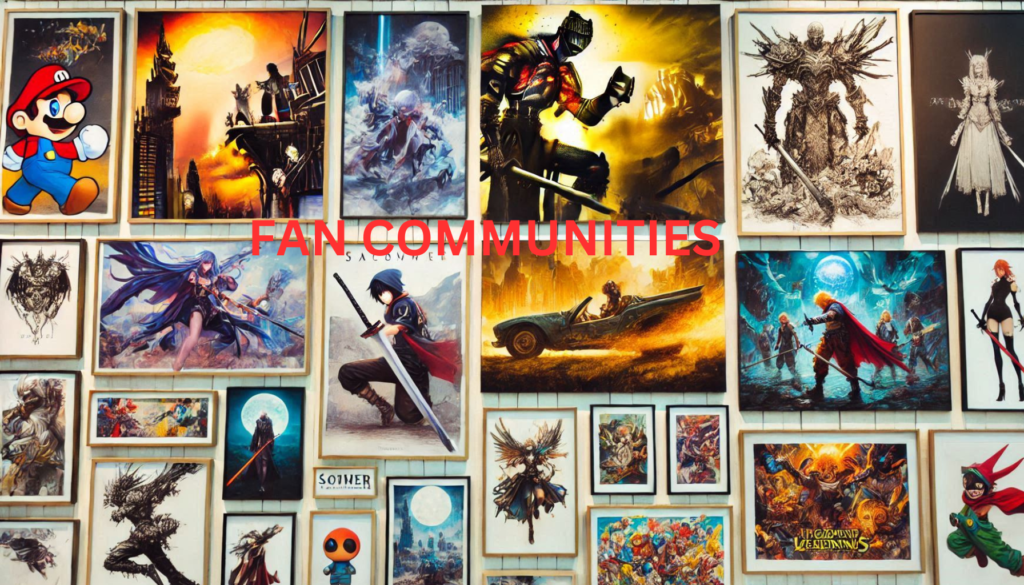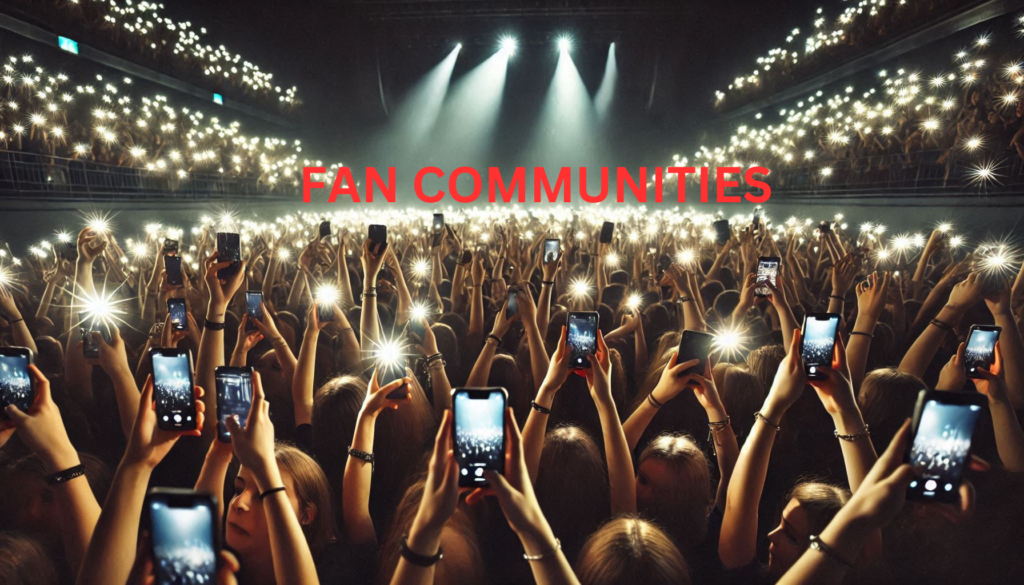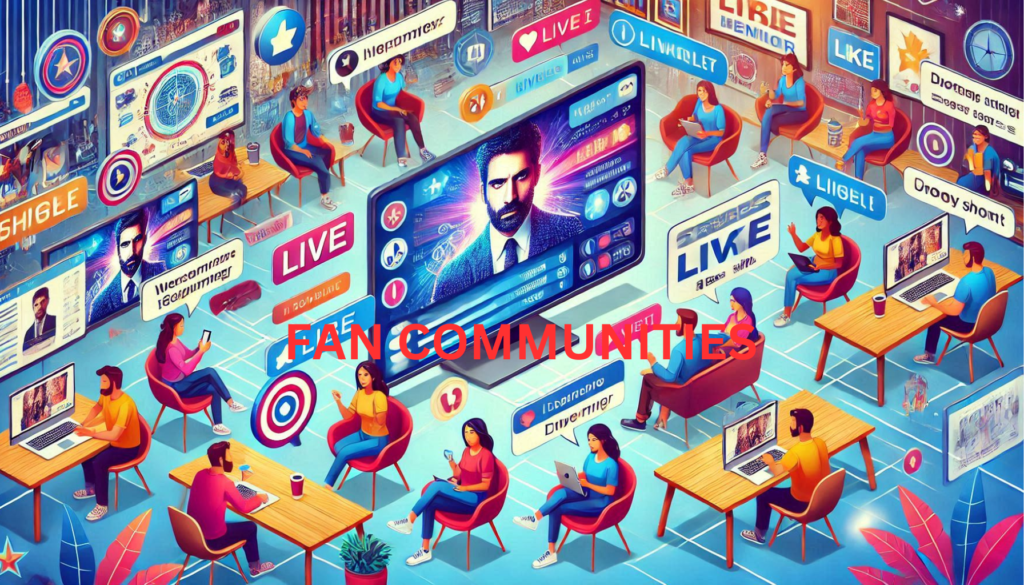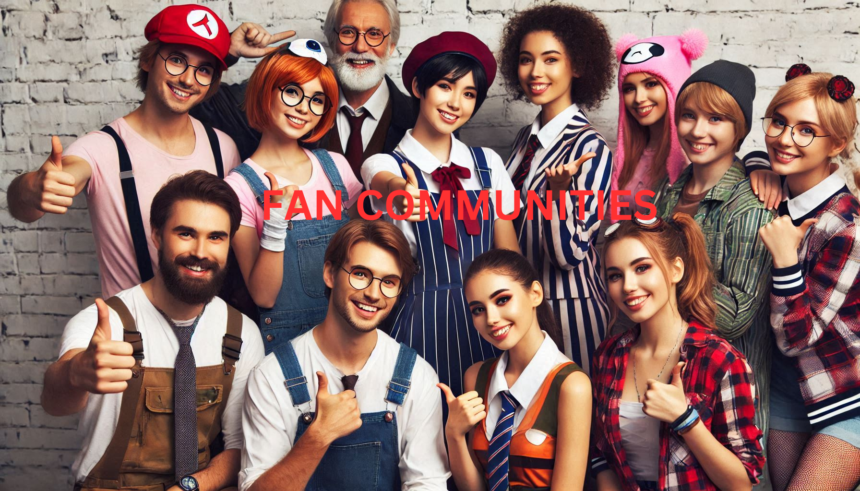Over time, Fan communities have changed a lot, growing from small, specialized gatherings into large, worldwide networks. As we move into 2024 entertainment, it’s important to look at whether these groups are becoming more welcoming or turning into closed clubs. This article will explore the history, advantages, difficulties, influence, and future of fan groups, giving a complete picture of their two sides. We’ll also look at a specific example and use KEYwords to make the article easier to find online.
History of Fan Communities
Fan communities, also called fandoms, have been around for many years, starting in the early 1900s. They first started with people who loved science fiction books, comic books, and early TV shows. When the internet became popular in the late 1900s, these fan groups changed a lot. Now, people could use websites, social media, and special fan pages to talk to each other from all over the world, share things they liked, and have discussions.
What Are Fan Communities?
Fan communities are made up of people who all like the same thing, like a TV show, movie, book, or famous person. You can find these groups on different websites, like social media, online forums, or special fan pages. People in these groups talk to each other, share drawings they made, write stories about their favorite things, and sometimes go to special parties or meetings.
Benefits of Fan Communities in Detail
1. Sense of Belonging
Fan communities give people a strong feeling of being part of a group. When they connect with others who like the same things, they feel like they belong to something bigger. This is especially helpful for those who might feel alone or disconnected in their everyday lives. This sense of community creates friendship and support, making fans feel understood and appreciated.
2. Creative Expression
Fan communities are lively places where people share their love for something. They show their passion by making different kinds of art, fan fiction, fan art, costumes, and videos. These activities help fans practice and improve their skills. They also get support and praise from others in the group. This creates a friendly space where everyone can enjoy being creative.
3. Networking Opportunities
Joining a fan community offers chances to meet new people and make important connections. Fans often work together on projects, plan events, and attend gatherings, which can help them build professional relationships and friendships. These relationships can be especially helpful for those trying to start a career in fields like entertainment, art, or writing.
4. Emotional Support
Fan communities can give people important emotional help. They create a friendly place where members can talk about their thoughts, feelings, and experiences without worrying about being judged. This is very useful when life is tough, as members can get understanding and helpful suggestions from others who share their views. The caring atmosphere in these groups can greatly improve emotional health.
5. Skill Development
Being part of fan groups can help you learn new skills. Whether you’re writing, drawing, organizing events, or managing social media, fans often improve their talents by being active in these groups. These skills can also be useful in other parts of life, like work and personal growth.
6. Enhanced Engagement with Content

Joining a fan community makes people more involved with the content they love. Fans usually explore more about the stories, ideas, and small details of their favorite shows, books, or movies, which makes the immersive experience more enjoyable and interesting. This deeper involvement can make people enjoy and feel happier with the content.
7. Promotion and Support for Content Creators
Fan communities are very important for helping and encouraging content makers. By doing things like sharing content, making fan art, and joining conversations, fans keep their favorite creators going and help them reach more people. This support can make the content more popular and successful..
8. Collective Activism and Influence
Fan groups can use their combined strength to support causes and have an impact. They might work to keep a show on the air, help a good cause, or encourage more variety and fairness in the content. Together, fans can create change and draw attention to important topics.
9. Economic Impact
Fan groups help the economy by buying things like merchandise, event tickets, and other related items. This spending supports the businesses connected to their interests and can help small markets grow. Also, fan conventions and events bring in a lot of money and create jobs.
10. Cultural Impact
Fan groups play a big part in our culture by enjoying and protecting different types of media. Their excitement and hard work help important cultural things stay popular and loved for a long time. Fans also change popular culture by bringing in new thoughts, styles, and words that become common.
A Haven for Inclusivity or an Exclusive Club?
A Haven for Inclusivity
Inclusivity is a key and valued part of fan communities. These groups usually create a friendly space for people from all kinds of backgrounds. Online platforms allow fans from around the world to come together, talk about their experiences, and enjoy their common interests. This sense of belonging is especially important for groups that might not feel accepted in other places.
- Diverse Representation: Fan groups usually encourage and enjoy seeing different kinds of people in the media. They want stories that show many types of genders, relationships, races, and backgrounds.
- Support Networks: These groups can be very important for people who feel alone or not accepted. Members get support and understanding from others who have similar experiences.
- Safe Spaces: Many fan groups work to make places where everyone can share their thoughts without worrying about being judged or bullied.
- Global Connection: The internet lets fans from everywhere come together in one group, making people feel like they belong and understand each other better.
- Empowerment: Being in a welcoming fan group can make people feel strong because it shows they are accepted for who they are and lets them share their thoughts and ideas.
An Exclusive Club
Even though many fan groups aim to be welcoming, some can act like exclusive clubs where only certain people or groups control the discussions and decide who belongs. This can happen in different ways:
- Gatekeeping: Some fans might have specific ideas about what makes someone a “real fan,” and they might leave out people who don’t follow these often random rules.
- Cliques and Hierarchies: In bigger fan communities, smaller groups might form and create their own levels of importance, which can make it hard for new or less known members to feel part of the group.
- Toxicity and Harassment: Sometimes, fan groups can be harmful, with people being mean and pushing away members who don’t agree with the main ideas of the group.
- Cultural and Language Barriers: Even though online groups are worldwide, language and cultural differences can make it hard for some fans to fully join in.
- Resistance to Change: Some fan groups don’t like new ideas or changes to their favorite media, and they might leave out fans who enjoy these changes.

Impact of Fan Communities: A Haven for Inclusivity or an Exclusive Club
Impact on Individual Empowerment: Fan communities give people a place to share their thoughts and feelings openly. They help create a feeling of being part of a group, which is especially important for those who might feel alone in their everyday lives. For people who are often overlooked, these communities can be a safe place where they find comfort, acceptance, and a sense of shared goals. Because fan communities are worldwide, they bring together different ideas, helping people learn from each other, understand different cultures better, and build stronger friendships.
Impact on Content Creation and Consumption: Fan groups are important for how media grows and changes. They don’t just watch shows or movies; they also help make them better by sharing ideas, writing stories, drawing pictures, and giving opinions. This involvement can make creators think about new ideas, add more to their stories, and listen to what fans want. For example, the “Snyder Cut” of Justice League came out because fans asked for it. Fans can also point out things that were missed, which helps the media improve and last longer.
Impact on Industry and Business: Companies and entertainment businesses see that fan groups can help them connect with people and increase sales. Social media and fan-made content have become important ways to promote things. Businesses work with popular people in these groups to connect with the right audience. But if fan groups become mean or only for certain people, they can push away new fans, hurt a company’s image, and make it harder to reach more people.
Impact of Exclusivity: Inclusivity is usually a strong point of fan groups, but being exclusive can cause problems. Gatekeeping, which happens when some members decide who is a “real fan,” can stop people from being creative and make new members feel unwanted. This kind of exclusivity can split the group, forming smaller groups and creating a sense of who is more important. When a group becomes too focused on who is better, it can miss out on different ideas, making the group’s shared experiences less valuable.
Impact on Social Movements: Sometimes, fan groups can start bigger social changes. They might push for more diversity in movies and TV, fight for fairness, or support a good cause. These groups can create the energy needed to make things better. With the help of the internet, fan groups can work together on issues in the entertainment world and beyond. This shows how fans can be a strong, organized force for change.
Key Takeaways:
- Empowerment and Support: Fan groups offer emotional help, make people feel accepted, and give a sense of being part of a community, especially for those who feel left out.
- Influence on Content: Fans help decide what kind of content is made by being involved and sharing their opinions, which affects what gets created.
- Impact on Business: Companies use fan groups for advertising, but being too exclusive can cause problems and hurt how people feel about the brand.
- Social Movements: Fan groups can lead movements for social change, spreading awareness about important issues and pushing for better representation.
Future of Fan Communities: A Haven for Inclusivity or an Exclusive Club
The way fan groups grow and change in the future will depend on technology, how people behave socially, and how we enjoy media. Looking forward, there are some important changes that will likely affect these groups.
1. Increasing Inclusivity Through Technology: As virtual reality (VR) and augmented reality (AR) become more popular, fan groups might become more welcoming and easier to join. Virtual places could let fans from anywhere in the world talk to each other at the same time, bringing people together from different places and backgrounds. These new technologies will offer exciting experiences that let fans enjoy content and connect with each other in fresh ways, making their bonds even stronger.
2. The Power of Niche Communities: In the future, fan communities might have more small, specific groups. As social media changes, people can join smaller, more focused groups that match their special interests. This could lead to a wider variety of fandoms, where people join groups based on very specific interests. While this might make some people feel more included, it could also cause the communities to become more separated.

3. Integration of AI and Personalized Content: Artificial intelligence (AI) and data analysis will probably become more important in how fan groups work in the future. Using AI, fan websites can give people content and experiences that match what they like. This way of making things special for each person can make fans more interested and involved, leading to a stronger and more active community.
4. The Role of Fan Communities in Shaping Media: Fan groups are playing a bigger part in how media is made and changed. In the future, TV and movie companies might work even more with fans, letting them help decide what happens in stories, how characters grow, and where the whole series goes. Asking fans for their ideas might become common, giving these groups a big say in making creative choices.
5. Evolving Social Movements Within Fandoms: As people who love certain shows or stars keep working for fairness, showing different kinds of people, and treating everyone the same in the world of entertainment, their groups can become strong places for making bigger changes in society. These efforts are likely to grow stronger, with fans using their shared voice to ask for more variety and welcoming spaces, not only in the shows they watch, but also in the groups they belong to.
6. Addressing Toxicity and Gatekeeping: To keep fan communities healthy and lasting, it’s important to deal with harmful behavior and unfair practices. Tools to manage these issues, ways to stop bullying, and rules made by the community will probably get better over time. Websites might create new ways to make sure fan groups stay safe and welcoming, stopping actions that leave people out.
Key Takeaways:
- Technological Advancements: Virtual Reality, Augmented Reality, and Artificial Intelligence will make fans feel more involved and included.
- Niche Communities: Small, focused fan groups will grow, bringing both good things and difficulties for variety.
- Creative Influence: Fans will keep shaping media, with more chances to take part directly.
- Social Change: Fan groups might lead social changes, working for better representation and fairness in entertainment.
- Managing Toxicity: As fan groups get bigger, there will be more focus on making welcoming, safe places for everyone.
Conclusion:
Fan communities have always played a big role in entertainment, giving fans a place to connect and share their excitement. By 2024, these groups are becoming even more inclusive and innovative. Thanks to new technology, like virtual reality (VR) and augmented reality (AR), fan experiences are getting more interactive, letting people from all around the world connect in fun and new ways. Although issues like toxic behavior and gatekeeping newcomers still exist, there’s a stronger effort to make sure these groups stay open and friendly for everyone.
In the future, fan groups in the entertainment world are expected to grow and do well, especially with more interactive experiences for fans to enjoy content. These groups will probably keep affecting not just how media is made, but also how entertainment companies connect with their fans. As technology gets better, fan groups might become even more involved in the entertainment world, helping to decide things like movie stories, TV show ideas, and interactive experiences.
FAQs:
1. What are fan communities?
Fan communities are groups of individuals who unite around shared passions for a specific TV show, movie, book, video game, or celebrity. These groups facilitate discussions, create fan content, and connect people with similar interests from all over the world.
2. How do fan communities impact entertainment?
Fan communities significantly impact entertainment by driving demand for content, shaping trends, and often influencing the direction of franchises. Their collective voice can lead to renewed seasons, sequels, or spinoffs. They also create marketing opportunities and provide direct feedback to creators.
3. Are fan communities inclusive?
While inclusivity is a major focus for many fan communities, some still face issues with gatekeeping and toxicity. However, in recent years, more communities are adopting better practices to ensure that they welcome diverse individuals and encourage respectful, open dialogue.
4. What role will technology play in the future of fan communities?
The future of fan communities is heavily tied to technology. Virtual reality (VR), augmented reality (AR), and artificial intelligence (AI) will enable fans to engage with their favorite content in immersive and interactive ways. These tools will help break down geographical barriers, allowing fans to meet and connect globally.
